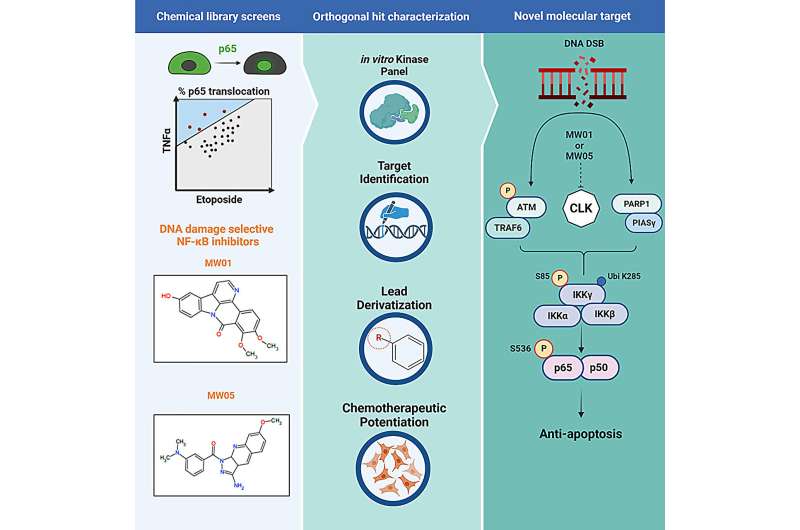This article has been reviewed according to Science X's editorial process and policies. Editors have highlighted the following attributes while ensuring the content's credibility:
fact-checked
peer-reviewed publication
trusted source
proofread
Researchers identify two lead compounds that could close cancer cells' escape route

Chemotherapy and radiotherapy aim to destroy cancer cells by inducing DNA double-strand breaks—damage that, once inflicted, usually causes the cells to die. But damage to a cell's genetic material also activates a signaling pathway called IKK/NF-κB that helps prevent cell death, thus limiting the success of these treatments in patients.
NF-κB is a family of gene regulators that controls a wide variety of cellular processes—from immune responses to embryonic development—and is activated by the enzyme complex IKK. The IKK/NF-κB signaling pathway cannot simply be blocked, as it performs many vital functions in the body.
Researchers led by Professor Claus Scheidereit of the Max Delbrück Center have now succeeded in identifying two lead compounds that inhibit activation of the IKK/NF-κB pathway only when the signaling chain is triggered by DNA double-strand breaks. The team has described how this works in the journal Cell Chemical Biology.
'A pharmacological challenge'
There are two enzymes that trigger the IKK/NF-κB pathway when they sense DNA double-strand breaks: ATM and PARP1. "ATM must not be pharmacologically blocked under any circumstances, as it is essential for biological emergency programs," says Scheidereit. In the event of DNA damage, he explains, it activates the protein P53, which stops the cell cycle and causes the cells to die. This makes P53 the natural adversary of NF-κB.
"PARP1 also performs other important functions in the cell," Scheidereit continues. "And the regulating kinase complex IKK, which is located at the bottom of the signaling cascade, should also not be blocked directly as it is required for NF-κB activation in many other signaling pathways." Developing selective NF-κB inhibitors that act only as a result of DNA damage therefore presents "a pharmacological challenge," the scientist explains.
Together with Dr. Jens Peter von Kries and Dr. Marc Nazaré, respective heads of the Screening Unit and Medicinal Chemistry Group at the Leibniz-Forschungsinstitut für Molekulare Pharmakologie (FMP), the team examined 32,000 substances. They eventually zeroed in on two compounds—MW01 and MW05—that block the signaling pathway only when it is triggered by DNA double-strand breaks.
When they delved deeper to find out exactly what these substances block, the scientists made a surprising discovery: active derivatives of MW01 and MW05 bind to and switch off the kinases CLK2 and CLK4—which are necessary, they found out, for signal transmission between ATM and IKK. Kinases are enzymes that transfer phosphate groups to other target molecules, thereby controlling these molecules.
"CLKs have never before been associated with functions relevant to our signaling chain," says Patrick Mucka, the study's lead author. "However, CLK2 is often overexpressed in colorectal and lung cancer, as well as in glioblastoma and breast cancer. So it appears to play an important role in tumorigenesis or cancer progression."
More promising cancer therapies?
Experiments on osteosarcoma (bone cancer) cells showed that the substances actually make the cells more sensitive to chemotherapy. After a short pretreatment with MW01 or MW05, significantly more cancer cells died during subsequent genotoxic treatment. Scheidereit is hopeful that the CLK inhibitors will show similar effects in further preclinical studies. But although results to date indicate that the inhibitors may increase the success rate of genotoxic cancer therapies, it may be years before CLK inhibitors are clinically approved.
Initial toxicological tests in mice showed that the substances were very well tolerated. "Incidentally, a side effect seems to be that enzymes involved in tumor growth processes beyond the IKK/NF-κB signaling pathway are also inhibited," Scheidereit says. "This can only be beneficial when used in cancer therapy—a double whammy, so to speak."
More information: Claus Scheidereit, CLK2 and CLK4 are regulators of DNA damage-induced NF-?B targeted by novel small molecule inhibitors, Cell Chemical Biology (2023). DOI: 10.1016/j.chembiol.2023.06.027. www.cell.com/cell-chemical-bio … 2451-9456(23)00205-2
Journal information: Cell Chemical Biology
Provided by Max Delbrück Center for Molecular Medicine




















